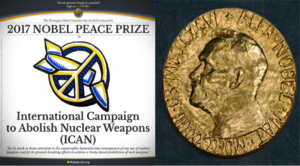
McLeod Group guest blog by Douglas Roche, December 7, 2017
Not long before the 2017 Nobel Peace Prize winners gather in Oslo to celebrate the progress made in nuclear disarmament, North Korea successfully tests a new long-range missile considered capable of a nuclear attack on the U.S.
How disjointed can the world become?
The awarding of the Nobel Peace Prize to the International Campaign to Abolish Nuclear Weapons (ICAN) for its work in the development of the new Treaty on the Prohibition of Nuclear Weapons has lifted the spirits of all those who have been working so long for a nuclear weapons-free world. But every newscast, with North Korea and the U.S. insulting and threatening each other, drags us down again.
The elimination of nuclear weapons, the ultimate evil, is possible. People’s movements want it. But the power structures won’t allow it. We are getting a better understanding that nuclear weapons are incompatible with the spread of human rights. All the nuclear powers are modernizing their arsenals, and the U.S. alone plans to spend $1.2 trillion in the next three decades on nuclear arms.
Some nuclear disarmament!
The contradictions of the modern world are blatantly illuminated by the crisis of nuclear weapons. The jarring juxtapositions make it hard for us to maintain a balanced view, let alone sustain hope that the political systems of the world can prevent the annihilation of humanity.
Speaking for myself, the only way I can maintain a reasonably balanced perspective is to keep remembering that all great social movements for change go through three stages. First, the idea is ridiculed and dismissed by the establishment. Second, the political powers vigorously object to it. Third, the idea is accepted as public policy. The movements to end slavery, colonialism and apartheid all passed through these three stages. The nuclear disarmament movement has now entered stage two.
The idea of the abolition of nuclear weapons is no longer dismissed as pie-in-the-sky. Sufficient studies, activism and policy-making have been done to put nuclear disarmament on the political centre stage. When the U.S., the U.K. and France jointly stated that they would never under any circumstances sign the Treaty on the Prohibition of Nuclear Weapons (the ink on the document hardly dry at the time), they showed they are indeed taking it seriously. As well they should, for the treaty stigmatizes the very possession of nuclear weapons, never mind threatening to use them. States which sign the Treaty acknowledge that nuclear weapons stand completely outside every aspect of international humanitarian law.
The military doctrine of nuclear deterrence, by which a state threatens to annihilate an adversary if attacked by nuclear weapons, has never been so directly challenged. It certainly was not challenged by the nearly 50-year-old Non-Proliferation Treaty, which enjoins states to negotiate in good faith the elimination of nuclear weapons (which, of course, they have never done).
A new threshold against the possession of nuclear weapons has been crossed, the precise point Pope Francis made at a recent high-level conference at the Vatican on nuclear weapons. The Pope “firmly condemned” the “very possession” of nuclear weapons, a step considerably further than his predecessors took when, during the Cold War, the Holy See gave a limited moral acceptance to nuclear deterrence as long as it was not made a permanent policy.
The moral and legal rejection of the possession of nuclear weapons has clearly moved nuclear disarmament forward. Yet it continues to be blocked by the entangling alliances of the military-industrial complex (which U.S. President Dwight Eisenhower warned his countrymen about in 1961) and duplicitous politicians who give grudging lip service to the ultimate elimination of nuclear weapons while putting muscle and money into modernized arsenals.
So, as it turns out, nuclear disarmament is not for the faint of heart or those who would like a quick fix and get the world stabilized quickly. The greed and power structures so evident in the wildly disproportionate accumulation of wealth by the very rich and the daily struggles for survival by the poor are a reminder that chaos is the dominating characteristic of the modern world.
Chaos drives me crazy – or at least it would if I did not keep constantly in mind that the struggles for human rights and the dignity of all human beings have always been fraught by the incessant greed of the power structures. The nuclear disarmament movement will enter stage three when enough people manifest their demand for political stability in the whole world.
Douglas Roche is a former Senator and former Canadian Ambassador for Disarmament. His latest book is Hope Not Fear: Building Peace in a Fractured World.
